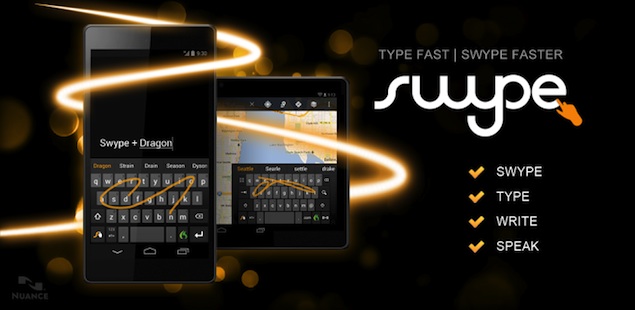Swype keyboard app for Android comes to Google Play, supports four Indian languages
By Anupam Saxena | Updated: 25 April 2013 15:38 IST

Click Here to Add Gadgets360 As A Trusted Source

Advertisement
Nuance has launched the latest version of its Swype keyboard for Android smartphones and tablets and has released it for the first time on the Google Play Store. The app has exited beta and is available for an introductory price of $0.99, though a 30 day trial is available as well.
The latest version of Swype also includes support for four Indian languages namely Tamil, Urdu, Hindi and Hinglish (a mixture of Hindi and English), allowing Swype users in India to choose from the different languages while using the Swype keyboard.
In addition to the new languages, the new version of Swype also brings what the company calls 'dialect based Living Language support' for Indian English, that automatically updates the Swype dictionary with popular Indian words.
Swype had added Hinglish input support to its keyboard, last year, learning Hinglish words as users key them in.
"Swype was a game changer when first unveiled, and ever since, it has continued to set the bar for intuitive and intelligent keyboard innovation - so much so that others have tried to follow," said Mike Thompson, executive vice president and general manager, Nuance Mobile. "Based on the incredible success of our beta program and our vocal customers, we decided to extend the power of Swype to more Android users through Google Play. Android users deserve the best keyboard - settling for an alternative is no longer necessary."
Swype allows people to swipe their finger from one letter to the next to input text - or tap, speak or handwrite letters, numbers and symbols. Nuance had updated Swype to support what it calls Living Language, earlier this year. The keyboard continuously updates each user's personal language model with the words and phrases they use the most - and with opt-in connected services they can also get the words and phrases trending around the world through crowdsourcing. Swype can follow a user from one device to another with Backup and Sync.
SwiftKey, another popular keyboard app for Android devices, had also added support for Hindi and Hinglish to its language portfolio in December.
The latest version of Swype also includes support for four Indian languages namely Tamil, Urdu, Hindi and Hinglish (a mixture of Hindi and English), allowing Swype users in India to choose from the different languages while using the Swype keyboard.
In addition to the new languages, the new version of Swype also brings what the company calls 'dialect based Living Language support' for Indian English, that automatically updates the Swype dictionary with popular Indian words.
Swype had added Hinglish input support to its keyboard, last year, learning Hinglish words as users key them in.
"Swype was a game changer when first unveiled, and ever since, it has continued to set the bar for intuitive and intelligent keyboard innovation - so much so that others have tried to follow," said Mike Thompson, executive vice president and general manager, Nuance Mobile. "Based on the incredible success of our beta program and our vocal customers, we decided to extend the power of Swype to more Android users through Google Play. Android users deserve the best keyboard - settling for an alternative is no longer necessary."
Swype allows people to swipe their finger from one letter to the next to input text - or tap, speak or handwrite letters, numbers and symbols. Nuance had updated Swype to support what it calls Living Language, earlier this year. The keyboard continuously updates each user's personal language model with the words and phrases they use the most - and with opt-in connected services they can also get the words and phrases trending around the world through crowdsourcing. Swype can follow a user from one device to another with Backup and Sync.
SwiftKey, another popular keyboard app for Android devices, had also added support for Hindi and Hinglish to its language portfolio in December.
Comments
Get your daily dose of tech news, reviews, and insights, in under 80 characters on Gadgets 360 Turbo. Connect with fellow tech lovers on our Forum. Follow us on X, Facebook, WhatsApp, Threads and Google News for instant updates. Catch all the action on our YouTube channel.
Related Stories
Popular on Gadgets
- Samsung Galaxy Unpacked 2026
- iPhone 17 Pro Max
- ChatGPT
- iOS 26
- Laptop Under 50000
- Smartwatch Under 10000
- Apple Vision Pro
- Oneplus 12
- OnePlus Nord CE 3 Lite 5G
- iPhone 13
- Xiaomi 14 Pro
- Oppo Find N3
- Tecno Spark Go (2023)
- Realme V30
- Best Phones Under 25000
- Samsung Galaxy S24 Series
- Cryptocurrency
- iQoo 12
- Samsung Galaxy S24 Ultra
- Giottus
- Samsung Galaxy Z Flip 5
- Apple 'Scary Fast'
- Housefull 5
- GoPro Hero 12 Black Review
- Invincible Season 2
- JioGlass
- HD Ready TV
- Latest Mobile Phones
- Compare Phones
Latest Gadgets
- Tecno Pova Curve 2 5G
- Lava Yuva Star 3
- Honor X6d
- OPPO K14x 5G
- Samsung Galaxy F70e 5G
- iQOO 15 Ultra
- OPPO A6v 5G
- OPPO A6i+ 5G
- Asus Vivobook 16 (M1605NAQ)
- Asus Vivobook 15 (2026)
- Brave Ark 2-in-1
- Black Shark Gaming Tablet
- boAt Chrome Iris
- HMD Watch P1
- Haier H5E Series
- Acerpure Nitro Z Series 100-inch QLED TV
- Asus ROG Ally
- Nintendo Switch Lite
- Haier 1.6 Ton 5 Star Inverter Split AC (HSU19G-MZAID5BN-INV)
- Haier 1.6 Ton 5 Star Inverter Split AC (HSU19G-MZAIM5BN-INV)
© Copyright Red Pixels Ventures Limited 2026. All rights reserved.







![[Partner Content] OPPO Reno15 Series: AI Portrait Camera, Popout and First Compact Reno](https://www.gadgets360.com/static/mobile/images/spacer.png)









